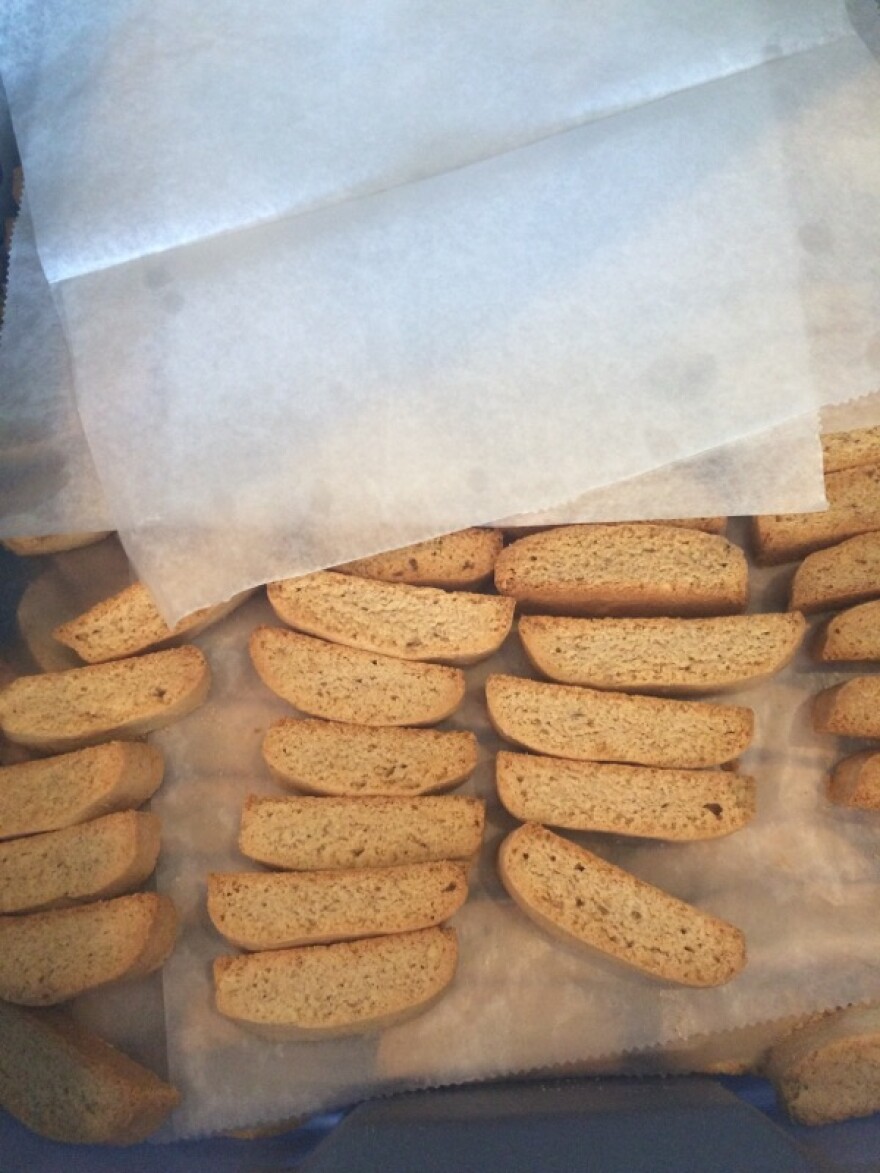This weekend is the 36th annual Greek Fest at Headwaters Park in Fort Wayne.
In this week’s NorthEATS Indiana, WBOI’s Lisa Ryan visits the women at Holy Trinity Greek Orthodox Church to learn about Greek culture in Fort Wayne and to find out how traditional treats like baklava are made.
You can actually hear the syrup sizzle as women pour the honey mixture over freshly baked baklava.
It’s one of the final steps in a 35-hour process that takes place over the course of five days.

“It takes a lot of work. We’re very proud of it. We do a good job, hopefully, and of course everything is wholesome. Nothing artificial, everything is pure and so when you eat it you know it is well done plus delicious and of course like I said, nothing artificial,” says Dina Naselaris, who has participated in Greek Fest since it first started 36 years ago. She moved to Fort Wayne from Greece in 1969, when she was 18 years old, and she didn’t expect to find Greek culture in the Indiana city.
“I was surprised that there was a community,” she said. “I did not expect there to be. It’s not a very big community, but everybody’s so close.”
She joined Holy Trinity Greek Orthodox Church, which features an annual Greek Ball.
“I’m thinking, we are dancing American dances in Greece, I’m coming to the United States, everybody’s Greek dancing, what’s up with that,” she said.
"They're still following many of the traditions, even though they're very Americanized of course."
Mary Spirou’s family was among the first Greeks to arrive in Fort Wayne. This was in the 1920s, and she says growing up, there were less than 10 Greek families in the area, not even enough for a church. They would travel to South Bend or Indianapolis for worship.
“There was a very small Greek community, (until) after the Second World War,” Spirou said.
Spirou says after World War II, there weren’t many jobs in Greece, so people in Fort Wayne started bringing over extended family.
“The country was devastated after the war, the second World War,” she said. “The people that came over went into the factories here, so there was always work here for the Greek immigrants.”
The Greeks who immigrated to the U.S. after the war began to start families of their own, and the population kept growing. In 1962, there were finally enough families to establish the Holy Trinity Greek Orthodox Church in Fort Wayne.
Spirou says she has tried to pass down Greek culture to her children and grandchildren.
“They’re still following many of the traditions, even though they're very Americanized of course,” she said. “They still like the Greek traditions and the holidays.”
Greek Fest is a fundraiser for the church, but Spirou says it was started to share Greek culture with Fort Wayne.

Deanna Gountras felt like she was welcomed into the Greek community after she married her Greek husband. She now carries on the traditional recipes by baking food for the festival.
“We made powdered sugar cookies, the kourambiethes. We made Easter twist cookies. We made melomakarona, we made paximathia, we have a lot of different cookies,” Gountras said.
The women bake pastries for Greek Fest, and the men cook rice, lamb and even octopus. Gountras says the octopus is a popular menu item, which they cook by boiling first.

“It takes a while to do that to break it down, and then cook it on the grill. Once it’s nice and soft you cook it on the grill, lemon and oil,” she said.
She says it sounds weird, but it’s good.
Gountras has watched the festival grow from a small get-together in the parking lot to its current spot in Headwaters Park. It typically hosts about 10-12,000 people, but last year they had bad weather and the attendance wasn’t as good. So this year, good weather is all they’re hoping for.
“Pray for the weather,” says Anastasia Toam, who is helping make the baklava.
Gountras says the better the weather, the more the festival grows, and the more they can share their heritage—and their food—with the Summit City.







